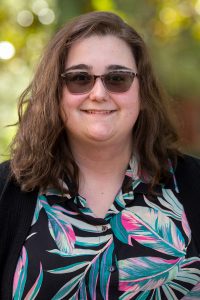Randolph alum joins College’s Office of Diversity, Identity, Culture & Inclusion

Hope Banton ’22
Growing up, Hope Banton ’22 would often lie awake at night wondering why she was who she was.
Now she hopes to help others who might face those same questions as the coordinator for Randolph’s Office of Diversity, Identity, Culture & Inclusion.
“It was always a calling, social justice work,” said the Rustburg native. “This just felt like the right thing for me.”
Banton majored in English literature, with a double minor in sociology and gender studies, and wrote her senior thesis about queer women in the south, “‘Othering’ Mothering: Alice Walker and the Queering of The Color Purple.”
Keesha Burke Henderson, Randolph’s chief diversity officer and director of the Office of Diversity, Identity, Culture & Inclusion, said it’s clear Banton has answered that deeper calling.
“That was the intention of this pipeline role, to nurture the student who has a strong interest in diversity, equity and inclusion work,” she said. “As a new graduate, Hope has stepped up to the plate by meeting the challenges of this high-demand position rather swiftly. She brings the experience of being a Randolph student while exhibiting the professionalism needed to be a resource.”
Randolph sociology professor Danielle Currier served as Banton’s advisor for three years and called her “kind, gentle, generous, and thoughtful.”
“She is good at seeing both the big picture of the effects of social institutions and inequality and the minutiae of day-to-day life,” Currier said. “She is also open-minded and a good listener. She lets people be who they are and doesn’t try to mold them into what she thinks they should be.”
In the coordinator role, Banton serves as a community liaison for student affinity groups and oversees various events on campus, including the diversity office’s weekly Wind-Up Wednesdays in the Student Center.
They recently started a Friday night forum, where students meet to talk about what’s going on both on campus and in the world, and held an interest meeting for a Gender & Sexuality Alliance that would be open to students, faculty, and staff.
The office also hosts cultural programming and training sessions for students, faculty, and staff. Burke and Banton also work closely with students of color, members of the queer community, and commuter, international, and first-generation students.
“It’s really rewarding to help students,” Banton said, “and give them a place where they have a voice and are heard.”

